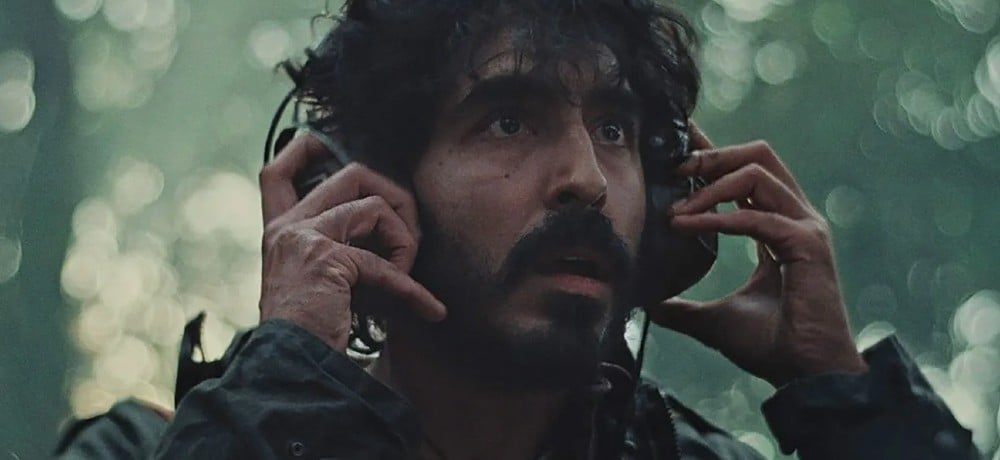






Bryn Chainey's sensorial debut, Rabbit Trap, is impressive. Beguiling, mournful, and perhaps too esoteric, but impressively composed nonetheless. Chainey's obsession with Welsh folklore about goblins and fairies is whimsically downtrodden; a slow-burning hallucination built on dark fantasies and demon seeds. Its problem is pacing and a more elusive third act rooted in Chainey's very personal, very real inner fears, which is guaranteed to divide audiences. Rabbit Trap burrows deep into forbidden soundwaves and regional woodland fables—almost too deep, without headlamps to guide the way.
Dev Patel and Rosy McEwen star as Darcy and Daphne Davenport, who've recently relocated to a remote cottage in the Welsh countryside. Daphne is a pioneering electronic musician à la Delia Derbyshire, hence the 1976 period selection. With Darcy's help, Daphne is honing her latest album by sampling Mother Nature’s noises, such as dripping faucets or bleating sheep. They live a quaint life, surrounded by professional-grade microphones and synthesizer equipment, until a nameless child (Jade Croot) wanders onto their property. The Davenports offer hospitality, welcoming the visitor with friendly warmth, but soon begin to worry when Croot’s unannounced guest starts arriving earlier, staying longer, and eventually refuses to leave.
Chainey's vision is precarious from the get-go. The 25-year-old Croot plays a blatantly Fae character who exists to upturn the Davenports' tranquility. Rabbit Trap does not hide Darcy's stumble into a mushroomy "fairy circle," which conveniently happens right before Croot's vagabond appears. Chainey does not conceal his young disruptor's intentions or background, instead opting for a lullaby-like sink into Welsh fables meant to entrance more than terrify. This isn't The Bad Seed or Orphan. Rabbit Trap lingers on minimalist dread as the Davenports fall under the child's unassuming spell, charmed into becoming parents for a total stranger.
The devil exists in Chainey's details, drawn from Brian Froud's encyclopedic Fairies literature. Chainey's extensive knowledge about fairie lore as it has evolved over the decades adds a personal touch to Rabbit Trap. The guzzling of milk, the nameless condition, the timid respect for nature's unseen entities—it's all highly researched. That said, it's also presented by someone who's scoured every nook and cranny of Welsh mythology about said fairies, making Rabbit Trap an intermediate course at least. What's not spelled out becomes a fever dream as richly green mosses, edible fungi, and slimy pools become the focus. What starts with Darcy's discovery of an unheard tone drops the sonic mystery of it all to become a confession of parental fears, stemming from visuals that provoke destabilization, not explanation.
Rabbit Trap is built on whispers of sorrow, which becomes frustrating and compelling in equal spoonfuls. Chainey's ambitious direction recalls In the Earth or The Hole in the Ground, yet with less straightforward horror storytelling. Andreas Johannessen's cinematography catches soggy Welsh environments with sharp framing, while musician Lucrecia Dalt and multi-hyphenate Graham Reznick collaborate on pitch-perfect sound design, both hypnotic and maddening. The technical fruits of the production's labor are on display, but it's still embodying "show, don't tell" a bit too unfavorably. Despite the dewy hikes and Wonderland-ish backdrops, the splendor on display remains elusive due to stalling momentum.
Patel, McEwen, nor Croot shoulder any blame. Rabbit Trap succumbs to its ethereal elements, but players appropriately match the mood. Patel's vulnerability swings through emotional outbursts as Darcy transitions from joviality to distrust to anger. McEwen portrays a cutting-edge artist yearning for her next breakthrough with a roguish mystique, respecting real-world influences like Delia Derbyshire and Daphne Oram. Then there's Croot, the shifty Fae-thing who draws from a soulful desire to belong and turns that against a childless couple. Actors wrestle with thematic heft while shooing away black-and-while deliveries, floating through scenes with daft expressions and perplexity versus your often irrational horror-type partners.
Did I enjoy Rabbit Trap in its entirety? Not particularly. Did parts fondly remind me of, say, Berberian Sound Studio or Gaia? In essence, yes. Chainey's inaugural feature is the bold announcement of a filmmaker to follow, but it's firmly planted in the "not for me" camp. He set out to make a "Tarkovsky film, or a Nic Roeg film, or an Apichatpong Weerasethakul film," and that avant-garde fearlessness tracks—for better and worse. Chainey's earned by attention, albeit with a film that provides more future promise than immediate returns.
Movie Score: 2.5/5